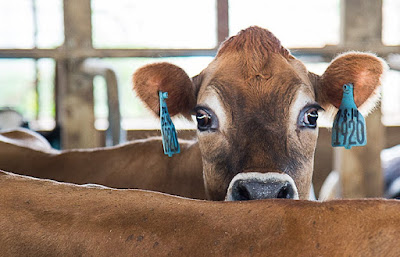Tips to avoid infertility in Dairy Cattle:
* Breeding should be done during the estrus period.* Animals that do not show estrus or do not come to cycle should be checked and treated.
* Deworming once in 6 months should be done for worm infestations to maintain the health status of the animals. A small investment in periodic deworming can bring greater gains in dairying.
* Cattle should be fed with a well balanced diet with energy, protein, minerals and vitamin supplements. This helps in increased conception rate, healthy pregnancy, safe parturition, low incidence of infections and a healthy calf.
* Care of young female calves with good nutrition helps them to attain puberty in time with an optimum body weight of 230-250 kgs, suitable for breeding and thereby better conception.
* Feeding adequate quantity of green fodder during pregnancy will avoid blindness in newborn calves and retention of placenta (after birth).
* In natural service, breeding history of the bull is very important to avoid congenital defects and infections.
Infections of the uterus can be largely avoided by having cows served and calved under hygienic conditions.
 |
| infertility in a cow |
* After 60-90 days of insemination, the animals should be checked for confirmed pregnancy by qualified veterinarians.
* When conception occurs, the female enters a period of anestrus (not exhibiting regular oestrus cycles) during pregnancy. The gestation (pregnancy) period for cow is about 285 days
* Unwarranted stress and transportation should be avoided during the last stages of pregnancy.
* The pregnant animal should be housed away from the general herd for better feeding management and parturition care.
* Pregnant animals should be drained of their milk two months before delivery and given adequate nutrition and exercise. This helps in improving the health of the mother, delivery of a healthy calf with average birth weight, low incidence of diseases and early return of sexual cycle.
